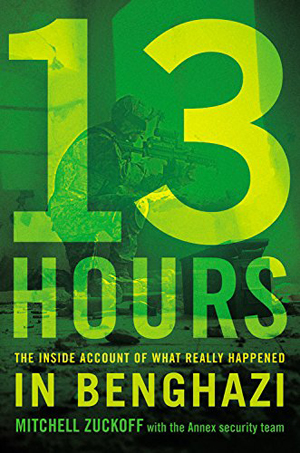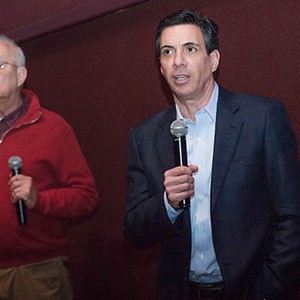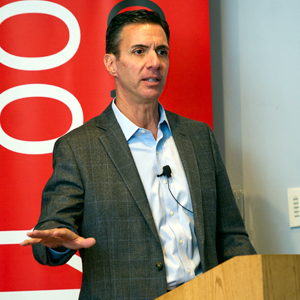Mitchell Zuckoff was initially wary when he took on the assignment of writing a book that would be the first to offer, outside of closed-door Congressional hearings, a private security team’s minute-by-minute account of what really happened during the September 11, 2012, Islamic militant attack on the US diplomatic compound in Benghazi, Libya. US Ambassador J. Christopher Stevens and three other Americans were killed in the seige. Several books had already been written as postmortems on the much-disputed events of the attack. Mired in politics, the details of the attack have taken on a Rashomon quality and remain ripe for exploitation by those with axes to grind.
But the College of Communication journalism professor’s coauthors, the five surviving members of the Annex Security Team, former military contractors charged with guarding the nearby CIA base, quickly won his trust, respect, and friendship. Two weeks after its publication, the account of that chaotic night—titled 13 Hours (Hachette Book Group)—hit number one on the New York Times combined print and e-book nonfiction best-seller list.
In the course of his research, Zuckoff met repeatedly with the five security operators: Mark “Oz” Geist, Kris “Tanto” Paroto, John “Tig” Tiegen, and two who asked to be identified by pseudonyms and appear in the book as Jack Silva and Dave “D. B.” Benton. A sixth team member, Tyrone “Rone” Woods, died in the rescue. The five describe in the book how they ultimately entered the diplomatic compound against orders from their CIA commander, orders they believe cost them valuable time that could have saved those under fire inside, says Zuckoff, the author of two previous best sellers based on real-life events, Frozen in Time and Lost in Shangri-La.
Bostonia spoke with Zuckoff about the book, subtitled The Inside Account of What Really Happened in Benghazi, and mistakes made in the attacks.
BOSTONIA: How did this project come about?
ZUCKOFF: I got a call from my agent, Richard Abate, in New York, who asked me, “What do you think about Benghazi?” He’d become aware that the guys who had fought the battle were sticking together and talking about doing a book.
Why did they take so long to come forward?
As CIA contractors, they had signed a nondisclosure agreement, and we had to deal with that. But they did tell their story during closed-door sessions in Congress. The House Intelligence Committee did a very good job keeping its testimony closed.

In this September 13, 2012, photo, a Libyan investigates the destroyed US Consulate in Benghazi after the attack that killed four Americans. AP photo by Mohammad Hannon
Did they have an ax to grind?
They were really frustrated that so many lies were told. That’s been a real problem for them, not being able to run to the phone and say, “What you just reported was bull.” These are very mature, serious guys who were able to understand that they would have their say in this book and had to be patient.
Were you worried that after you signed on, you wouldn’t believe their story?
Yes. We’d seen Dylan Davies, the security officer believed to have duped 60 Minutes. I wasn’t going to step into that honeypot. I took some reporter’s precautions. These were the guys that were actually there, and then I did a little bit of a gut check–when you meet with people you get a sense of, are they lying or embellishing? I interviewed them separately, and the differences between their accounts were all in normal tolerance levels.
Did you go to Benghazi?
I considered it, but the security situation had deteriorated to the point where the jeopardy didn’t balance the effort.
What mistakes were made in the response to the attacks?
Among the major mistakes was the lax security at the compound. This was a soft target, and the guys knew it. They’d been talking about it. In the book I describe how days before the attacks, they went to the compound and said to the Americans, “If you get attacked by a large element you’ll die.” It was a tragic mistake, a tragic error in judgment, having an ambassador in that environment on 9/11 in a place where there’s no functioning government and anti-American militias in the next compound.

Zuckoff met repeatedly with, and grew close to, the five security operators: Mark “Oz” Geist, Kris “Tanto” Paroto, John “Tig” Tiegen, and two who asked to be identified by pseudonyms and appear in the book as Jack Silva and Dave “D. B.” Benton. A sixth team member, Tyrone “Rone” Woods, died in the rescue.
The Times says the book’s big revelation was that the security contractors at the CIA annex were told to stand down.
Yes, the delay at the annex was a terrible, terrible mistake. They were soldiers and they’d experienced command decisions that they’d disagreed with before. It was only at the end that they decided to disobey those orders. They felt that they could’ve saved those people.
Do you think your book is likely to influence Congressional hearings on the Benghazi attack?
I think it will. It feels a little strange. I haven’t focused on it a lot, but to me there were so many things in the book that are just as important and tend to focus on the human aspect, things that might never be discussed in the hearings, such as the heroism of these men. There’s a moment in the book where Tyrone, Tig, and Jack are outside the front gate, and they know that inside are buildings on fire and men running around with assault rifles. And Tyrone pops up from behind this barrier and runs in the front gate. He died in the mortar attack.
Would you take on a project like this again?
I wouldn’t go looking for this kind of arrangement. If the right story came up, maybe. I don’t have a lot of interest in sitting down with a powerful CEO and doing an as-told-to book. This was such a rare opportunity to work with the actual participants. That’s a gift.


















































I have been closely following the Benghazi affair since the beginning.
I saw the Bret Baier interview on Fox News of three of the men on the security team who were in in Benghazi during the attack. I also had an opportunity to meet them at a briefing and book signing session in Richmond, VA.
Thank you very much, Prof. Zuckoff, for writing this book and telling the real story of what happened that tragic night.
George L. Getchell
Col, USAF (Ret)
College of Engineering ’54
A short time after the attack, help was asked for and not given. That is the story. Book sounds like a cover up.
I saw these 3 guys on TV a week or 2 back. Bret Baier of Fox News did a one-hour interview with them, which was very compelling, and very tragic. Also saw them talking with Jake Tapper on CNN. They are they real thing. And I thank heaven that we have men like that out there.
Thank you Prof. Zuckoff for writing this important book.